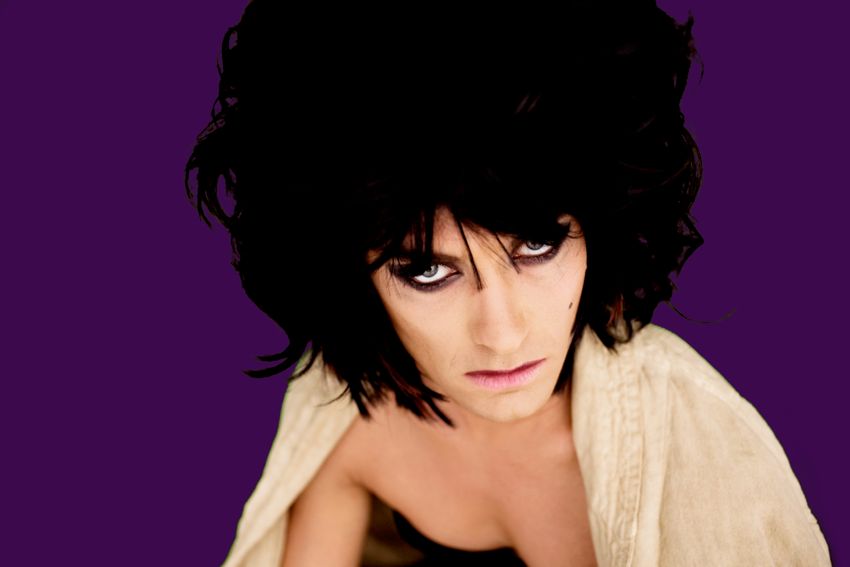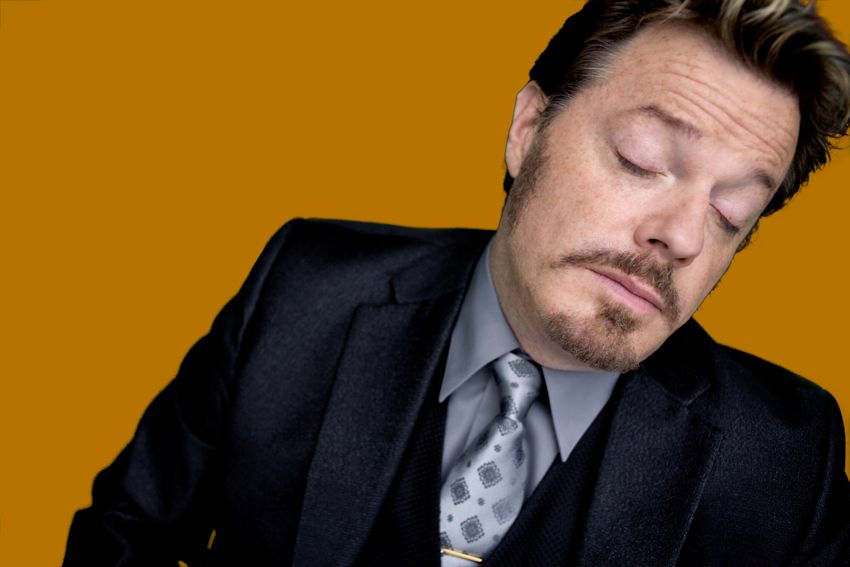Sally Potter: “The beginning of a new way of looking at film”
"Anyone can be a filmmaker. What's really hard is to make a good, interesting film. A computer doesn't help you write a better novel; writing in a notebook longhand is just as good.
"So technology can't do the job for you, but it can make the medium more accessible to more people... Within a short time, I could get 30,000 people coming to my site, from countries where Rage doesn't have distribution, and they're talking to each other about the themes they relate to in it. That's something that's so new and extraordinary, really."
Orlando director Sally Potter's latest film, Rage, will be the first feature-length film to premiere on mobile phones. With an ensemble cast including Eddie Izzard, Judi Dench, Diane Wiest, Jude Law and Steve Buscemi, the first of seven episodes of the film will be streamed on Monday on Babelgum's free mobile platform, across the US, UK, France, Germany, Italy and Spain, with a new episode of the film every day. The mobile launch will be closely followed by the DVD launch, an interactive satellite premiere across a number of UK cinemas (including the British Film Institute) and a live-stream on Justin.tv.
Phew. How can one film work in so many formats? Netribution asked Suchandrika Chakrabarti to meet up with Potter and find out.
 Netribution: So how does the film work with the various methods of distribution? People are going to be watching it in very different media.
Netribution: So how does the film work with the various methods of distribution? People are going to be watching it in very different media.
Potter: The film itself is a story that happens over seven days, so by its nature it divides into seven parts. As it's filmed in close-ups upon the actors' faces, it can work on a small scale, but also looks very beautiful up on the big screen. I think it does work at both ends of the visual scale. As it's a whodunnit, a murder mystery, it does keep you going into the next day and the next to find out how things unfold... each episode ends on a sort of cliffhanger.
People have the option to get the DVD later on, and there is also the premiere at the BFI, which is going out live on 40 screens across the country. There will be a Q&A after, and, for instance, Jude Law is going to be in New York, in his dressing room for Hamlet, and we're going to Skype him in.
Babelgum saw the film and really liked the idea of distributing it. This is one of their first feature films; it feels like the beginning of a new way of looking at films, and for people to access them easily and properly. Streaming technology is so much better these days.
N: Are you daunted by any of it?
P: It felt very much like leaping off a precipice. We didn't know where we would land. I've no idea how people are going to experience it - we're making it up as we go along. As people experience the film in different ways, it starts to morph, it's no longer a fixed entity - like the themes in the film itself. We're making the process and product be really reflective of each other, and the story itself reflective of how people can see it.

N: Where did the idea for Rage come from?
P: When I was taking my last film, Yes, to screenings, Q&As and so on, I was finding it a lonely experience, even though you're constantly meeting new people. So I decided to start a blog to share what it was like, and to make myself accessible online. I was astonished at the number of people who started coming in to the site, and also at the kinds of responses, how open and honest and truthful they were. People smell a rat if it's just a marketing scheme, they know when something's sincere. They're good at working things out online.
Actually, I wrote the first draft of Rage well over ten years ago, in fact, but I wasn't ready to do it then. It wasn't originally going to be monologues, but it was a murder-mystery. It wasn't until after my own direct experience with the internet that I thought, ahh, that's the way to do it. Then, having done Yes, which has confessional moments in it, I got really interested in the ancient art of the monologue, which you often get in reality TV these days, those fake diary-room confessions. The desire to unburden, to be listened to, it just fascinates me. People start out presenting the self that they want to present ot the camera, then it disintegrates, and you're left with the reality of them.
N: What did you blog about?
P: I didn't do it completely off-the-cuff. In my hotel room at night, I'd spend a bit of time editing my entries. I was noting down things I was doing, opening up the entries to comments on themes I was writing on. I found that it was possible to connect with anyone, strangers, people form all over the world, and it was amazing the depth of communication possible in that forum, and how open it was, how natural.
N: So the film was born out of you discovering the possibilities of the internet?
P: Writing the blog gave me an idea of how to transform a script I'd already written in a conventional way. I thought, let's give it a slant by seeing the story through the eyes of a child, who just holds a cellphone, and then puts the material out there. The whole way it was put together, the green screen, the software - it could be put together by any kid. That was the criteria for it. It was very, very low-budget, minimal, with a tiny crew and just one actor at a time, working in a very small space, my camera in their face.

N: So it's a film about technology as well as a film that utilises technology at every stage, even for the release?
P: That was the starting point, but the themes in the film, which are dealt with in these monologues from each of the characters - they don't interact with each other onscreen, only with the child behind the cellphone, Michelangelo - go into lots of things, like globalisation, the cult of celebrity, image. The apparent setting of the story, which is in New York, behind the scenes at a fashion show, is a setting you never actually see in the film. So you only ever see people's faces, talking, and a plain colour behind them. It's very stark, very intimate.You're really going back to the roots of performance, with the actors. Just a face, against a colour, talking directly to you. Where do you go with that? There are no special effects; it's just the great performances that you see. If someone is filming with a cellphone, people tend to go in fairly close - it's all arm's-length shots of faces.
N: But you didn't shoot with a mobile, did you?
P: No, I used a small handheld camera, but operated it the same way I would a mobile. There was a sound recordist for better quality. Although it wasn't shot on a phone, I reckon that in a generation or two, phones will be as good as what I had with that camera. It's only a matter of time.
N: Is Rage about the democratisation of filmmaking, thanks to technology?
P: Anyone can be a filmmaker. What's really hard is to make a good, interesting film. A computer doesn't help you write a better novel; writing in a notebook longhand is just as good. So technology can't do the job for you, but it can make the medium more accessible to more people.
I've been thinking a lot about this idea of democratising filmmaking, and I'm not sure whether that's really the case. I've used the phrase myself, but democracy is about one person, one vote. It's about people having a voice. I'm not sure the goal is that every single person in the world should be making a film. There wouldn't be enough people to watch. The accessibility is really something, though. There's no longer a meaningful barrier of money before you're able to make a film. It is a huge change. The internet model has changed distribution and marketing. People can now self-select much more.

N: How does technology tie into the other themes in the film?
P: Whether it's globalisation or climate change, they're all embedded in it. You can't ignore it, or you can ignore it, but it's pressing on you from every side. I think that the internet itself is one facet of globalisation, an element that I've found in some ways extraordinarily interesting. Within a short time, I could get 30 000 people coming to my site, from countries where Rage doesn't have distribution, and they're talking to each other about the themes they relate to in it. That's something that's so new and extraordinary, really.
N: It's a shift in the balance of power.
P: And a lot of filmmakers resist that. Everything's getting out of their hands... it's a control thing. Piracy, how you're going to make money - these things are important. Someone, somewhere has got to be paid, or there won't be a film industry as we know it any more. Of course, the music industry has already faced that. The idea behind Rage, though, is, well - embrace it. Work with it. See what inventiveness it stimulates.
For more information, please see www.ragethemovie.com / www.babelgum.com/rage
Mobile release available in the United States, United Kingdom, Italy, France, Germany and Spain via free Babelgum mobile application for next generation mobile devices (iPhone, Android, etc) from September 21st, 2009.